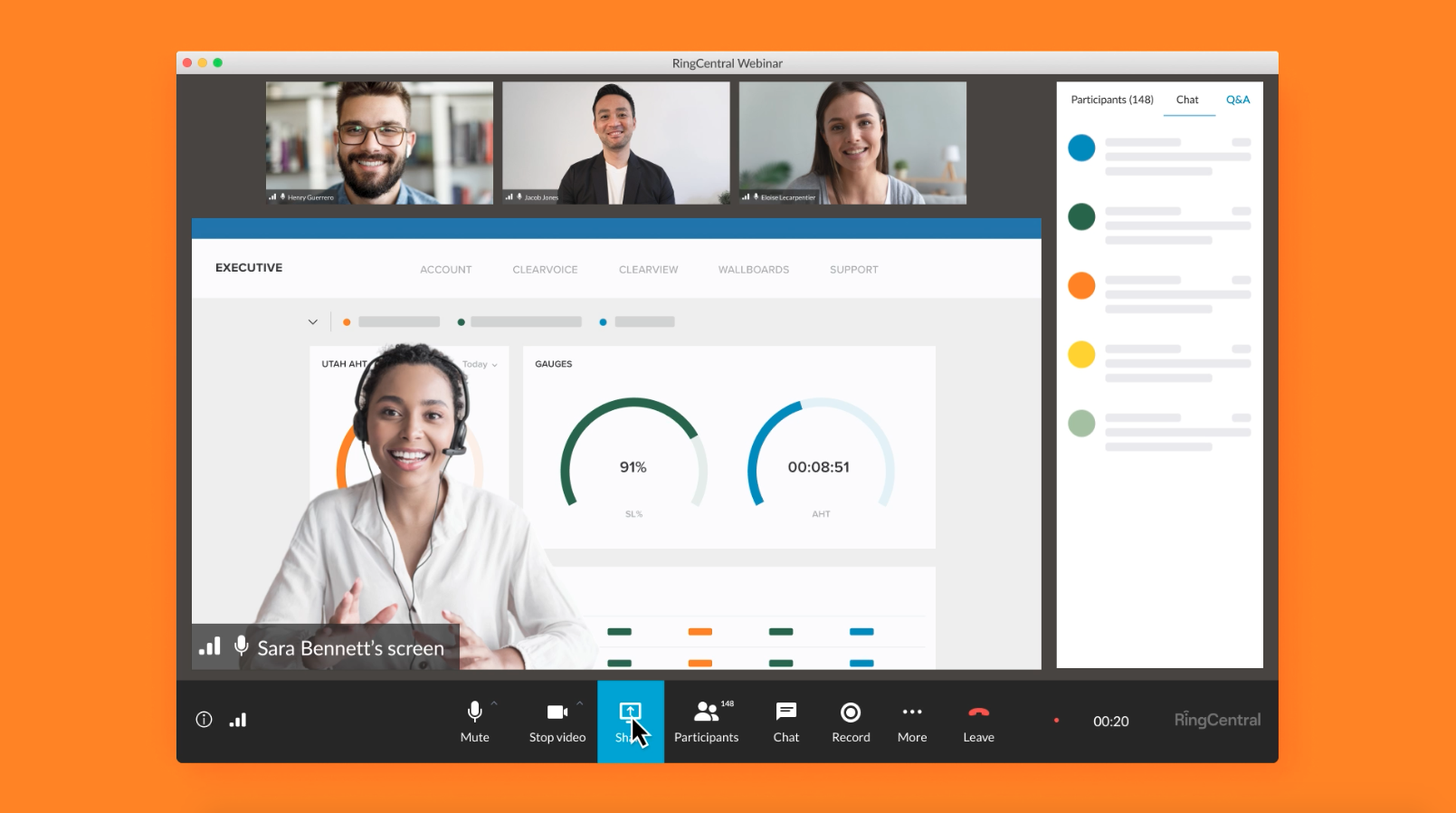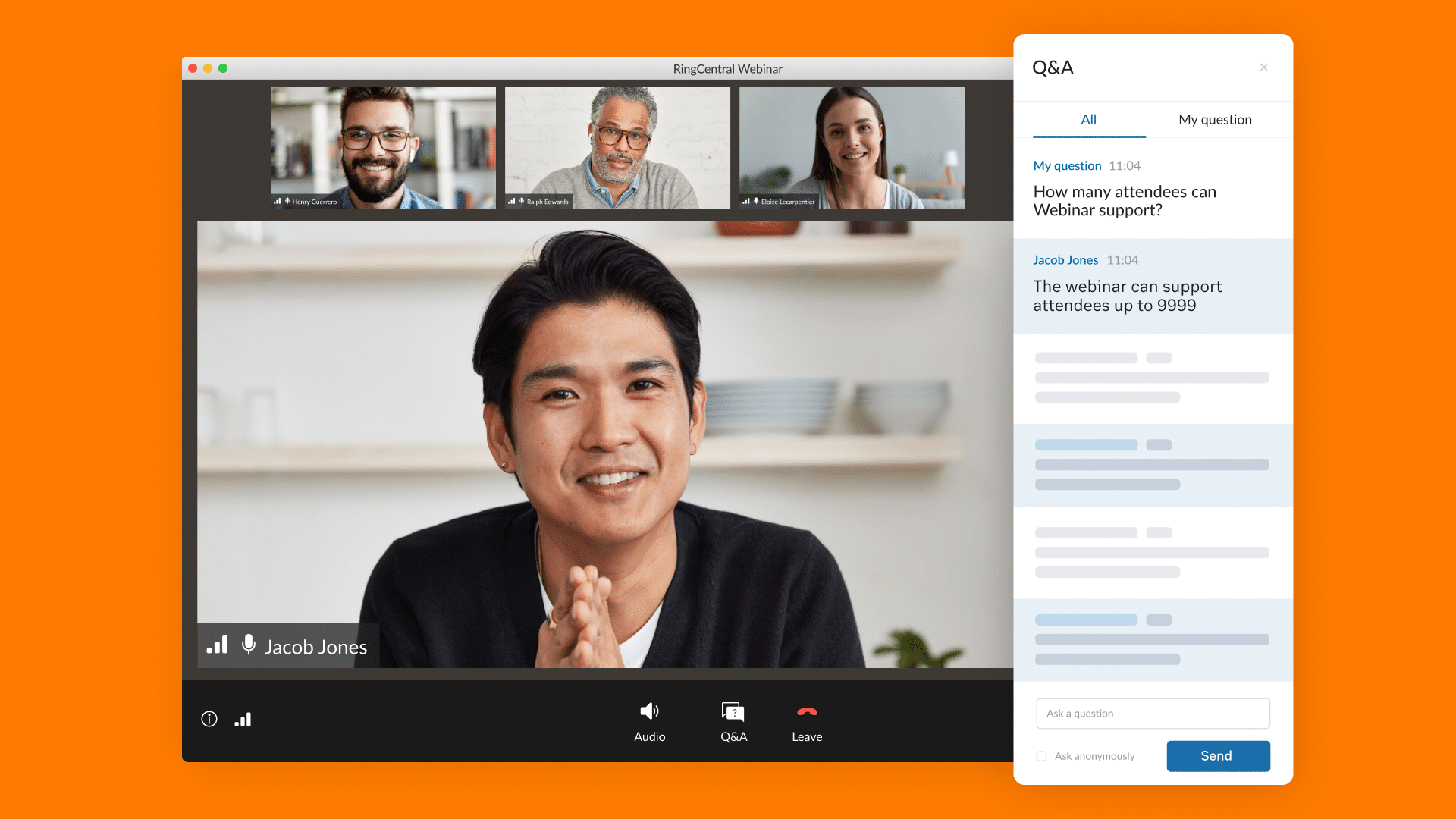Your ultimate event speaker sourcing guide
It’s your third date. You’ve spoken to a number of potential partners but so many just don’t cut it. You’re looking for someone who excites you, who brings adventure, someone you can learn from — and this person might just be the one.
Dating takes time, effort, and careful consideration. It’s actually a lot like trying to find the right speaker for an event. Finding the right speaker can be the difference between a full house and an empty one so taking the time to ensure they match your audience’s preferences is crucial.
Content can be the number one driver in registration in a virtual event as well as an in-person one, it’s a key reason people actually sign up for an event.
Finding speakers is one of the most essential parts of the business process in creating your event — don’t underestimate it.
And great content means great speakers. So, how do you pick the right people? Like many other parts of event management —from budgeting to sponsorship — it comes down to taking it one step at a time. Read on for a step-by-step walkthrough on how to secure the best speakers for your experience.
- Start your event speaker search early
- Determine who should (and shouldn’t) speak
- Prepare to win your dream event speakers
- Let the event speaker outreach party begin
- Narrow down your list of potential speakers
- Cross the finish line with your chosen speakers
- Make a lasting impression with your event speakers
1. Start your event speaker search early
The right speaker lineup can be a boon for your event. But if you wait too long or drag your feet searching for speakers, you’re going to have a bad time.
Events are big business and the industry is growing faster than ever, with:
- 42% of companies having already brought in-person events back
- 32% bringing in-person events back in the first half of 2022
- 31% having more virtual events in 2022
- And 63% of all companies planning hybrid events on top of their virtual or in-person ones
With so many competing events, it’s never been more important for the speaker lineup to create the draw you’re looking for and get would-be audience members excited about signing up for your event.
It’s also important to know how the popularity of virtual and hybrid events will impact your efforts to find great speakers.
Virtual sourcing includes:
- Less restrictions: Speakers are no longer bound by physical barriers like flight times, border restrictions, or travel budget.
- More inclusion: Anyone with a strong internet connection can speak at your event.
- More budget: Spending less on physical space and support, may mean more to spend on higher-quality speakers.
- Wider appeal: The ability to broaden both your speaker and audience search.
Virtual has also made it easier to craft a diverse speaker lineup. Speakers who may not have been able to attend an in-person speaking slot for personal reasons will have a much easier time speaking virtually. It is vital that your lineup is diverse as it makes your event stronger. Here’s why:
- More representation: By including speakers from a variety of backgrounds, you’re showing your audience that there’s space for everyone in your community.
- More richness: Diversity fuels differing opinions, which leads to a richer debate and more dynamic, natural conversations.
Long story short, start the process as soon as you know two things: what your event is all about and when it’s happening.
2. Determine who should (and shouldn’t) speak
In 2012, people waited 12 hours, outside, in 25℉ / -3℃ weather, in Michigan, in January, to see then-President Barack Obama speaking on college affordability.
The people you choose to speak at your event should do what Obama did that day: draw a crowd. But before you think about hiring a U.S. President to grace your agenda, you need to know exactly how and why that event is going to be awesome.
Start by clarifying your event goals and objectives.
It doesn’t matter whether you’re a team of one planning a small internal retreat or one of many working on an industry-wide mega event. Run through the following questions and make sure you have a clear vision for what your event is — and what that means for your speaker strategy.
- Know your audience: Who are they? What do they want? What kinds of speakers will be relevant to them?
- Consider your theme: Is there a central theme or focus to your event? How will speakers add or take away from that theme? What key message do you want to get across via your theme and speakers?
- Plan out your topics: Will you branch out from your central theme into several topics or tracks? What different topics do you want to cover?
- Visualize delivery: What must they cover and what can you be flexible about? How will your speakers’ content make it to your audience? Will you book speakers for a keynote address? For breakout sessions? How will they be joining you? Virtually? In person?
- Dig into your budget: If part of having a successful event means making sure you don’t blow your budget, how can you best use the money you have? Would you rather invest it all in one larger-than-life, super-personable speaker? Or spread it across several lower-profile-but-still-charismatic guests?
It is the vital questions like these that need to be answered to allow you to continue your search for the right speaker.
3. Prepare to win your dream event speakers
Given that booking speakers can feel like dating, you can find yourself asking questions like, are they looking for the same thing you are? You wouldn’t expect the search for a serious partner to begin and end within a week. Neither should your speaker search.
Draft an event info sheet and accompanying questionnaire or form so you can efficiently communicate what you have and what you need:
- Availability: Are they available on the date of your event? Can they commit to not just that time, but also any necessary rehearsals ahead of time? You don’t want to have your heart set on your dream speaker and then find out they’re not available for the dates you’ve picked.
- Topic: What do you want them to say? Do you have a clear sense of the content that needs to be covered, or are they going to be free to shape it themselves? Content is key — so make sure you give guidance on what you’re expecting.
- Location: Where is your event taking place? Is it virtual, in person, or hybrid? If in person, offer to arrange speaker travel.
- Audience: How many people will be there? What are the audience demographics (industry, age, interests, and more)? This will help your speaker hone their approach and remarks.
- Fees: Is the speaking gig paid? If so, what’s your budget? If not, what does the speaker get out of the opportunity (access to your audience, networking, exposure, or a chance to support a great mission)? Be clear about this from the start — no one likes having their time wasted.
- Next steps: What do you expect to happen next in the process? When is your deadline for letting them know whether they’ve been selected? Do you need to review content or slides by a certain date?
You’ll also want to ask for information from your speakers, like:
- Their full name and professional title: How should they be referred to? Is their name spelled correctly on all materials?
- A short biography: What are their bona fides? And what do they want your audience to know about them? Importantly, what part of their background establishes their expertise on the subject matter? Do they have degrees or have they completed extensive training?
- A headshot: Ideally a high-quality one you can put on your event website as soon as they sign on.
- A video link of them at previous speaking engagements: Are they equipped to deliver the quality content you’re looking for? You can always take a chance on someone less experienced, but in that case, look for media training or other public speaking exposure.
This information will help you vet speaking candidates and incorporate them into your event marketing.
4. Let the event speaker outreach party begin
The time has finally come, the moment you’ve been patiently preparing for — the search for your event speakers begins here.
Going back to our dating metaphor, maybe you have your eyes set on someone special or maybe you’re not sure who your dream speaker would be. Whatever your situation, there are a number of different ways to look for potential candidates. Let’s explore the six most commonly used:
Tactic #1: Hire an agency
There are talent agencies for everything, including events.
Agencies can be a very effective and quick way to find the speakers you’re looking for, especially if you’re under a tight deadline.
Agencies do cost money, though, and may also require you to follow their terms and conditions. For instance, certain agencies will have harsh terms that include not posting speakers’ information on public forums and paying invoices within seven working days.
If you want to work with celebrities, keep in mind:
- You’ll have to go through their agency: For famous talent, there’s basically an oligopoly on management, and you’ll probably be working with a big agency like CAA.
- You probably won’t get to talk to the celebrity directly: You’ll deal exclusively with their representation.
- Terms and conditions may be quite limiting: For instance, some stipulate that you cannot reuse any of the content post-event.
- Their price will be high: Their time is a commodity. And if their management is savvy, your chosen celebrity’s prices will have only increased during the pandemic, even for virtual engagements.
Tactic #2: Reach out through social media
If you know who you’d love to book, and they’re not famous enough to have a speaking agent, your best bet is to reach out to them on social media.
Since it’s typically used for job hunting and professional networking, LinkedIn is often known as the most professional of the social networks, so start there.
You’ll want your outreach to include:
- A hook: You need a compelling subject line and first sentence to make sure they open your message.
- Details: Make sure you include event context, like when your event is, how long they’ll be speaking for, and what their topic would be.
- A clear ask: Do you want to book time to discuss next steps? Include a link to your calendar. Or do you want them to send over their chosen topic? Offer a list and ask them to engage with it.
Keep in mind that you’re playing a numbers game. People with lots of followers on LinkedIn are probably the same people you want to speak at your event, and their profiles get lots of inbound requests.
Hedge your bets and create a long list of potential speakers. Just make sure to personalize your outreach to each.
Tactic #3: Ask for a referral
Leveraging your network may be the easiest way to secure a speaker.
Comb through your professional network, looking for speakers that interest you and with whom you have a second or third degree connection.
Asking a friend or colleague to introduce you to a potential speaker is the most effective way to make sure they actually engage with your messages — it also increases the likelihood they’ll say yes to joining your event.
Tactic #4: Call out for speakers
A call for speakers is a way to campaign, within your network and beyond, for talent to provide content for your event.
You can launch your campaign by:
- Sharing your call for speakers on the homepage of your event: This will signal to anyone interested in the topics you’re covering that content is needed.
- Send an update to your database: Reach out to your client base and/or your existing mailing lists to let people know you’re looking for qualified speakers for an upcoming event.
- Amplify the message on social media: Let your followers know you’re holding an open call for speakers. Add a link to your event homepage to encourage people to learn more (and even register).
- Add your event info and call for speakers to your email signature: You’re sending dozens of emails a day — why not have them help spread the word about your call for speakers? Make sure you have a clear CTA, like “Know a lot about DevOps? Sign up to speak at our conference.” Include a button that links to a sign-up sheet or form, and make sure you’re clear on when the call for speakers closes.
- Utilize your customer success managers: If you’re running a professional event, wouldn’t it be great to get some of your current customers involved? Ask your customer success managers for customers who would be a good fit based on the desired subject matter as it’s also a move that can strengthen your professional relationships.
- Ask your account executives: It’s not just current customers who can benefit from getting a speaking spot — prospective ones can, too. Ask account executives for prospects who know the industry or topic you’re covering and who would be interested in speaking.
- Lean on partnerships: Ask influencers within your industry to promote your call for speakers. You can also reach out to past speakers and ask them to notify their networks that you’re looking to bring on fresh voices. You can even ask them to share clips and write ups of their own experience speaking at your events.
Tactic #5: Tap company subject matter experts
Sometimes the perfect person was under your nose the whole time.
Consider looking at subject matter experts within your own company. They’ll have a vested interest in the success of your event, you know they’re qualified, and they can create valuable, educational content your audience will enjoy.
While it’s common for people affiliated with the organization hosting the event to speak at it, make sure you don’t use your own talent 100% of the time. It can reduce your audience’s interest and make it seem like you can’t get external talent to sign on.
Tactic #6: Survey your audience for a wishlist
You can guess what your audience wants to hear and who they want to hear it from.
Or you can straight-up ask them.
Send registrants (past or present) a quick survey with open-ended questions about the kind of content and speakers they’d like to see.
Once you have an idea of what they want, use that insight to hone your search. You can then include in your outreach to audience-identified speakers that their fans have specifically requested them. Everyone likes to know they’re wanted.
5. Narrow down your list of potential speakers
Ideally, you now have a long list of potential speakers to choose from.
Often, it’s not just you deciding who from your wishlist will be chosen. Bigger organizations often have multiple stakeholders involved in signing off on a speaker list, including:
- Product marketing leaders: They’ll ensure speakers are in line with your company’s positioning and goals.
- Subject matter experts: They’ll confirm the speaker’s background and ability to credibly speak on the topic.
- Prospecting team: This is the team that helped you source speakers, and who will want visibility on the final direction.
These checks and balances ensure that your chosen speakers map to various team priorities and goals, and that your audience will be excited to hear from them.
Common questions you and your stakeholders will go through include:
- How have they performed in previous situations? The best way to know how they’ll resonate with your audience is to see them in action. If sent, watch their video clips, or look at speaking gigs listed on their website. Also look through their social media accounts to get a sense of how they communicate.
- How do they align with your event goals? Ask for a sample of their presentation, and look through the slides. Is it in line with what you want to get across to your audience?
- Are there particular strengths or weaknesses they have? Do they have a great, positive energy you can harness by incorporating a Q&A session after their talk? Or do they tend to ramble, so you should be ready to gently give time warnings?
- Is there anything you should worry about when it comes to attaching them to your brand? Look through media mentions and their social profiles to see what they talk about. Are there any flags that make them a bad choice for your event and audience?
Once you’ve vetted your speakers and gotten stakeholder approval, you can reach out to your favorites to have final screening conversations. Set up video calls so you can get a better sense of their presentation style.
6. Cross the finish line with your chosen speakers
Now it’s time for one of the most exciting parts of the process: telling people they’ve been accepted.
Set yourself up for success by including clear, thoughtful messaging at every step. That looks like:
- Post-submission messaging: Acknowledge you’ve gotten their application and let them know when they’ll hear back.
- Clear updates: If someone’s application is being reviewed, make sure they know. That will help them be extra-responsive to any additional information you may need.
- Thoughtful declines: Your brand’s reputation is on the line here. These would-be speakers invested their valuable time in this opportunity, so show respect for it. You also may want to use them for future events, so keep your messaging warm and gracious.
- Enthusiastic acceptances: For those speakers that did make it through your funnel, it’s time to celebrate: Welcome them and thank them for joining you in making this event possible.
- Press releases: Aside from letting your speakers know one-on-one, you’ll want to let the public know what’s in store at your event. Work with a PR firm to send a release, or write one up and share it on your own content hub and social channels.
You’ll want to send accepted speakers a speaker toolkit. Investing in a good one can help set you up for event marketing success. Include:
- Guidance for promoting the event on social media: Provide social assets, like headers, GIFs, and images, as well as key messages, links, and hashtags to include.
- Instructions for updating speakers’ LinkedIn profiles to show they’ll be speaking at your event: You can ghostwrite posts for them or encourage them to tag your company and sponsors in posts of their own. Also share screenshots of past speakers who have added their speaking engagements to their profiles.
7. Make a lasting impression with your event speakers
Just like dating, finding the right speaker takes time and a lot of vetting. It’s something to jump into at the very beginning of your event lifecycle –– otherwise, you’ll risk having subpar content.
Whether or not you have an idea of which speaker to source, and regardless of the tactics you use to find them, you’ll want to have a solid list of potential options to avoid having to go with someone you’re not excited about. So, be sure to cast a wide net.
Once you’ve secured the perfect person, continue to give them a VIP experience. In return, they’re likely to help amplify your event through their social presence, be a driver for increased registrations, and potentially refer you to more superstar speakers in the future.
Contact a member of the RingCentral Events team to see how you can give your speakers the best possible experience from start to finish.
Originally published Sep 01, 2022, updated Oct 20, 2024





